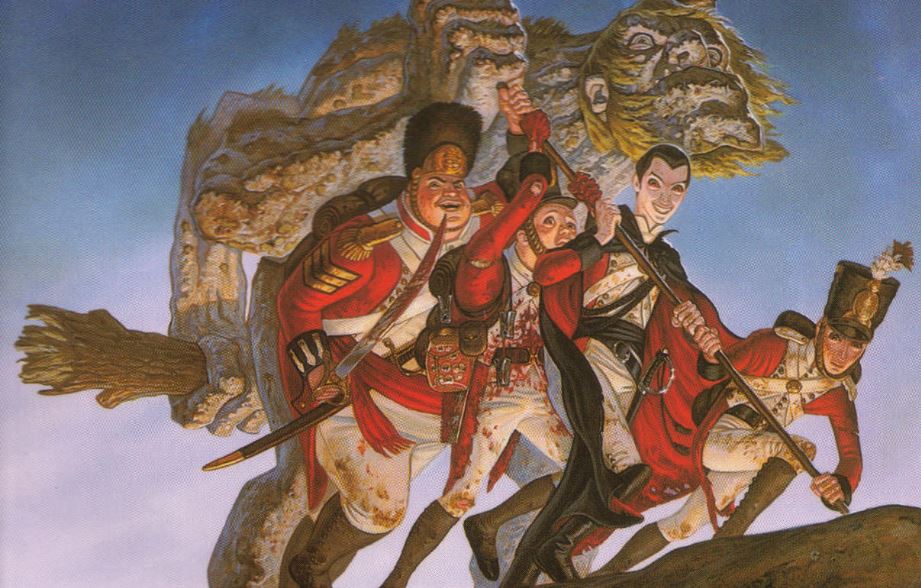Phew! We made it, guys – 2017 is here, finally, and it is not mindless optimism talking when I say that I hope everyone who suffered in 2016 suffers a great deal less in 2017, and that things pick up for all of us. As Sir Terry was so fond of reminding us, optimism and the sheer stubborn refusal to give up is often all we have. Ponder that, Discworld fans.
So here we are, a new year and a new book. I well into my second year of this re-read marathon, when I hoped it would be done in just over a year, but I am going to take my own advice and not beat myself up about it. We’re all busy people, after all, and my new goal of July 2017 seems very reasonable to me. Buckle up and let’s get going!
‘Monstrous Regiment’ is a powerhouse of a novel. It isn’t my favourite but objectively I must say that it is certainly one of the technically best books of the series. It is, along with ‘Small Gods’ and ‘Feet of Clay’, one of the books where Sir Terry’s manifesto shines through; he’s got something to tell you and woe betide anyone who isn’t ready to listen.
The story follows Polly, a barmaid from the tiny country of Borogravia who disguises herself as a boy and joins the army, in the hope that she can find her brother who went away to war and never came back. Along the way she joins up with a ragtag group of recruits, including a troll and a coffee addicted vampire. They fight under the watchful eye of the famous Sergeant Jackrum, and it isn’t long before Polly realises that some of her fellow recruits share her secret.
What I liked best about this book is that Sir Terry does not stick to one narrative here. It could easily have been a story about women and how the man’s world they live in underestimates and ridicules them. It is about that, but it doesn’t stop there. At some point in the second act, you stop thinking about the fact that the soldiers are women in hiding and realise they are just soldiers, soldiers living through a ridiculous and pointless war.
Their femininity comes in useful, especially when they smuggle themselves into a castle by shedding their uniforms and becoming themselves, but it no longer defines their struggle. It’s a treatise on war and the pointlessness of fighting, one of Sir Terry’s favourite subjects. ‘Monstrous Regiment’ comes very soon after ‘Night Watch’, a book on a similar topic, and I wonder if the tumultuous period of a post 9/11 world, in which these books were published, has anything to do with it.
If ‘Night Watch’ is a story about revolution and standing up to tyranny, ‘Monstrous Regiment’ focuses on lies, propaganda and the power of fear. Borogravians believe in Nuggan, a god whose most fervid followers are out of control, and the Duchess, a mortal ruler who may or may not already be dead. The people are controlled by these ‘deities’, oppressed by a government who refuses to allow them the truth of what is happening in the war and in the world in general.
Polly and her comrades learn this quickly, willing as they are to see things from a different point of view. Their main contact with the outside world is roving reporter William de Worde, last seen in ‘The Truth’ and wholly welcome here. I didn’t think we’d see him again, so his appearance was a bonus in an already great book. He soon dissolves the Borogravian myth of ‘Vimes the Butcher’, a bloodthirsty and vicious warlord intent on bringing Ankh-Morpork into the war, and the regiment never looks back. I love their ability to see things clearly, if only they were given a chance.
Ultimately, I think, this is my favourite thing about ‘Monstrous Regiment’ and about a lot of Pratchett’s ‘manifesto novels’; he gives his characters a chance to learn. He shows that any character, any person, is capable of learning and growing, and no one should be underestimated. So many of his people are decent at heart, no matter how or why their minds may have been poisoned in the past, and they do accept new things and new points of view, if only they are given a chance to experience them. I for one to cling to this goodness.
Of all Sir Terry’s messages, I think it could easily be the most important one of all.
Some of the coverage you find on Cultured Vultures contains affiliate links, which provide us with small commissions based on purchases made from visiting our site.

